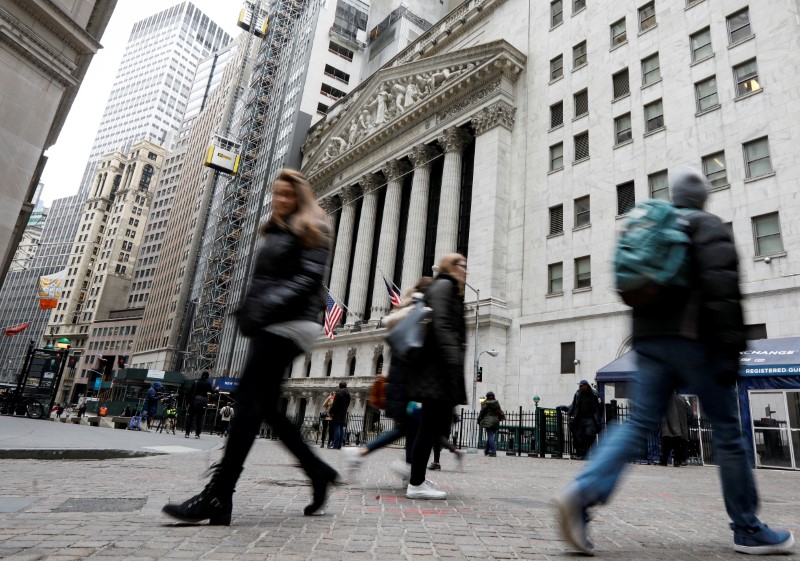By Caroline Valetkevitch
NEW YORK (Reuters) - A long rally in technology stocks has left investors thirsting for more, but that could be a mistake as the strengthening U.S. economy points to better value in other stocks.
Heavyweights like Apple (O:AAPL), Alphabet (O:GOOGL) and Facebook (O:FB) have especially helped growth indexes in the past year rise more than value indexes, which right now are heavily weighted in financials.
Tech so far in 2018 is the best-performing sector too, leading the recovery from the market's steep selloff in early February, with the Nasdaq hitting record highs again in recent sessions.
That's reflected in the performance of major benchmarks for portfolio managers, including the Russell 1000 growth index (RLG), up 6.1 percent so far this year, compared with the Russell 1000 value index (RLV), down 0.5 percent since Dec. 31.
But some money managers are betting that trend may have gone on for too long. They argue that value stocks, which tend to have lower valuations, will look especially appealing relative to growth as the economy accelerates above its historic growth rates.
"That growth has continued for as long as it has and as lopsided as it is doesn't mean the world has changed. It means we're overdue for the pendulum to swing back to value," said David Katz, chief investment officer at Matrix Asset Advisors in New York.
Growth and value are two classic approaches to investing, with growth investors typically searching for companies that have higher profit growth and margins, while value investors look for stocks that seem undervalued.
A shift from growth to value could come slowly.
Based on Thomson Reuters Lipper data, so far in 2018, U.S. fund investors have been pulling more money out of value funds than growth.
CLS Investments Chief Investment Officer Rusty Vanneman, who has already shifted to favouring value over growth, said investors tend to chase performance, and "tech names have been the glamour names."
To be sure, many tech stocks do well when the economy improves, and every sector has stocks in both value and growth.
Katz thinks banks, energy and some stocks in health care, including Gilead Sciences (O:GILD), make good value buys right now.
Helping the argument for value, some strategists say, is a robust economic expansion in the United States. The economy is also being given additional fiscal stimulus through sweeping changes to the tax law approved by Congress late last year, including a reduction in the corporate tax rate.
Growth stocks mostly have outperformed value since the bull market began nine years ago and far outpaced them last year, when the S&P technology index (SPLRCT) rose nearly 37 percent compared with the S&P 500's gain of 19.4 percent.
In 2017, the Russell growth index rose 28.4 percent versus a gain of 10.9 percent in Russell value.
"It's definitely more difficult to find the proper risk-reward ratio in growth right now," said Alan Lancz, president of Alan B. Lancz & Associates Inc., an investment advisory firm, based in Toledo, Ohio.
The price-to-earnings ratio for the Russell growth index last year hit its highest since 2002. The index is now trading at about 20 times forward earnings, down slightly from recent levels. The value index is trading at less than 15 times earnings, its lowest since 2016, according to Thomson Reuters DataStream data.
"It's a valuation argument. Growth has done phenomenally and the valuations reflect that," said Ernesto Ramos, head of quantitative equity strategy at BMO Global Asset Management.
Multiples have risen "across the board," said Michael O'Rourke, chief market strategist at JonesTrading in Greenwich, Connecticut. But, he said, "if everything is expensive, value offers a higher margin of safety."
Financials, which benefit from higher interest rates and would get a boost from reduced regulations that are expected under the Trump administration, have the biggest weighting in the Russell value index, accounting for about 28 percent of the index, according to Thomson Reuters data.
Technology as a sector has the biggest weighting in the Russell Growth 1000 index, accounting for roughly 39 percent.
JPMorgan Chase (N:JPM), Berkshire Hathaway (N:BRKa), Exxon Mobil (N:XOM), Bank of America (N:BAC) and Wells Fargo (N:WFC) represent the biggest weightings in the Russell 1000 value index, while Apple, Microsoft (O:MSFT), Amazon.com (O:AMZN), Facebook and Alphabet are the biggest weightings in Russell 1000 growth.
Besides telecommunications, financials have the lowest valuation of any S&P 500 sector, trading at about 13.9 times forward earnings compared with technology, which has among the highest, at 19.2 times forward earnings, according to Thomson Reuters data. The benchmark S&P 500 (SPX) is trading at 17.3 times forward earnings.

With value, "you're basically trading tech exposure for financials exposure," Ramos said.